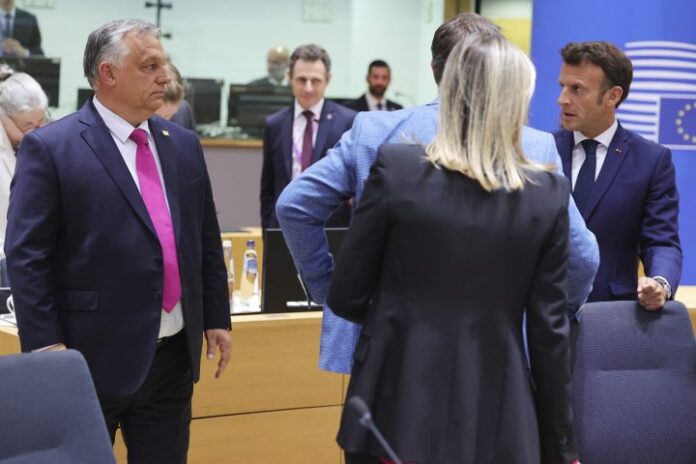European Union leaders agreed Monday to embargo most Russian oil imports into the bloc by year-end as part of new sanctions on Moscow worked out at a summit focused on helping Ukraine with a long-delayed package of new financial support.
The embargo covers Russian oil brought in by sea, allowing a temporary exemption for imports delivered by pipeline, a move that was crucial to bring landlocked Hungary on board a decision that required consensus.
EU Council President Charles Michel said the agreement covers more than two-thirds of oil imports from Russia. Ursula Von der Leyen, the head of the EU’s executive branch, said the punitive move will “effectively cut around 90% of oil imports from Russia to the EU by the end of the year.”
Michel said leaders also agreed to provide Ukraine with a 9 billion-euro ($9.7 billion) tranche of assistance to support the war-torn country’s economy. It was unclear whether the money would come in grants or loans.
The new package of sanctions will also include an asset freeze and travel ban on individuals, while Russia’s biggest bank, Sberbank, will be excluded from SWIFT, the major global system for financial transfers from which the EU previously banned several smaller Russian banks. Three big Russian state-owned broadcasters will be prevented from distributing their content in the EU.
“We want to stop Russia’s war machine,” Michel said, lauding what he called a “remarkable achievement.”
“More than ever it’s important to show that we are able to be strong, that we are able to be firm, that we are able to be tough,” he added.
U.S. will not send missile systems to Ukraine that can reach Russia, Biden says
Michel said the new sanctions, which needed the support of all 27 member countries, will be legally endorsed by Wednesday.
The EU had already imposed five previous rounds of sanctions on Russia over its war. It has targeted more than 1,000 people individually, including Russian President Vladimir Putin and top government officials as well as pro-Kremlin oligarchs, banks, the coal sector and more.
Trending Stories
6 teens shot in Tennessee in weekend with 13 U.S. mass shootings
Canadians may see a 0.5% interest rate hike this week thanks to ‘persistent’ inflation
But the sixth package of measures announced May 4 had been held up by concerns over oil supplies.
The impasse embarrassed the bloc, which was forced to scale down its ambitions to break Hungary’s resistance. When European Commission President Ursula von der Leyen proposed the package, the initial aim was to phase out imports of crude oil within six months and refined products by the end of the year.
Both Michel and von der Leyen said leaders will soon return to the issue, seeking to guarantee that Russia’s pipeline oil exports to the EU are banned at a later date.
Hungarian Prime minister Viktor Orban had made clear he could support the new sanctions only if his country’s oil supply security was guaranteed. Hungary gets more than 60% of its oil from Russia and depends on crude that comes through the Soviet-era Druzhba pipeline.
Von der Leyen had played down the chances of a breakthrough at the summit. But leaders reached a compromise after Ukrainian President Volodymyr Zelenskyy urged them to end “internal arguments that only prompt Russia to put more and more pressure on the whole of Europe.”
“Stop Russian oil”: Activists play dead to demand embargo on Russian energy – Apr 29, 2022
The EU gets about 40% of its natural gas and 25% of its oil from Russia, and divisions over the issue exposed the limits of the 27-nation trading bloc’s ambitions.
In his 10-minute video address, Zelenskyy told leaders to end “internal arguments that only prompt Russia to put more and more pressure on the whole of Europe.”
He said the sanctions package must “be agreed on, it needs to be effective, including (on) oil,” so that Moscow “feels the price for what it is doing against Ukraine” and the rest of Europe. Only then, Zelenskyy said, will Russia be forced to “start seeking peace.”
It was not the first time he had demanded that the EU target Russia’s lucrative energy sector and deprive Moscow of billions of dollars each day in supply payments.
But Hungary led a group of EU countries worried over the impact of the oil ban on their economy, including Slovakia, the Czech Republic and Bulgaria. Hungary relies heavily on Russia for energy and can’t afford to turn off the pumps. In addition to its need for Russian oil, Hungary gets 85% of its natural gas from Russia.
Orban had been adamant on arriving at the summit in Brussels that a deal was not in sight, stressing that Hungary needed its energy supply secured.
Von der Leyen and Michel said the commitment by Germany and Poland to phase out Russian oil by the end of the year and to forgo oil from the northern part of the Druzhba pipeline will help cut 90% of Russian oil imports.
The issue of food security will be on the table Tuesday, with the leaders set to encourage their governments to speed up work on “solidarity lanes” to help Ukraine export grain and other produce.
Karel Janicek contributed to this story from Prague.
© 2022 The Canadian Press



